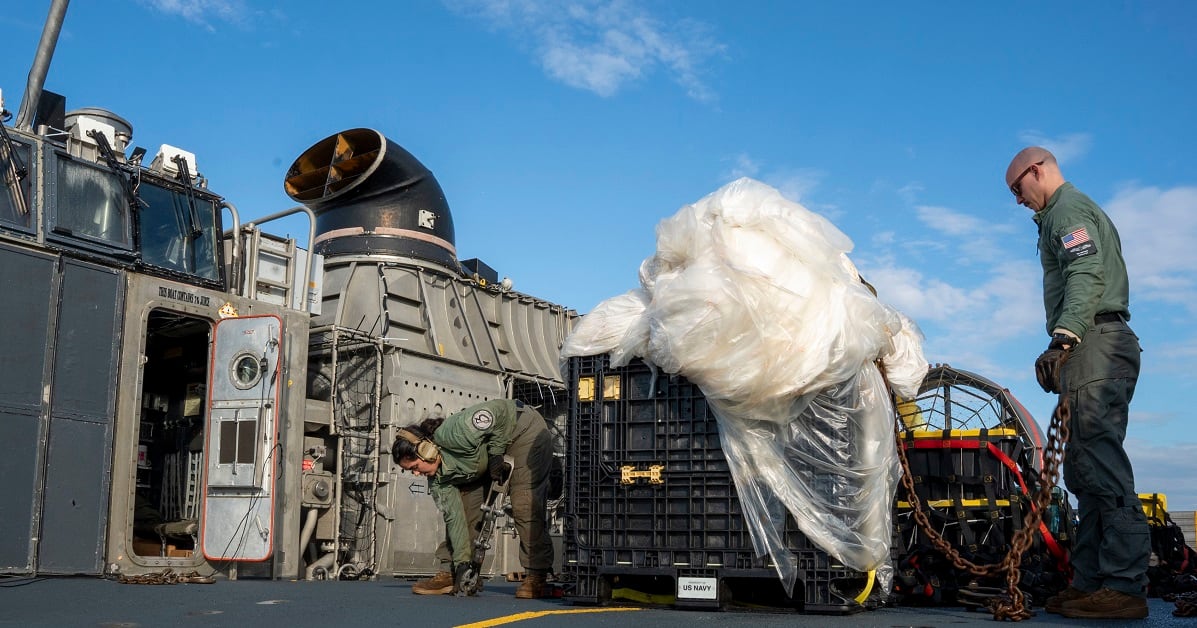The U.S. military said late Friday that it has ended its search for airborne objects that were shot down near Deadhorse, Alaska, and over Lake Huron on Feb. 10 and 12.
The statement came hours after officials said the U.S. has finished efforts to recover the remnants of the large balloon that was shot down Feb. 4 off the coast of South Carolina, and analysis of the debris so far reinforces conclusions that it was a Chinese spy balloon.
Officials said the U.S. believes that Navy, Coast Guard and FBI personnel collected all of that balloon’s debris off the ocean floor, which included key equipment from the payload that could reveal what information it was able to monitor and collect. White House national security spokesman John Kirby said a significant amount of debris was recovered and it included “electronics and optics” from the payload. He declined to say what, if anything, the U.S. has learned from the wreckage so far.
U.S. Northern Command said in a statement that the recovery operations ended Thursday and the final pieces are on their way to the FBI lab in Virginia for analysis. It said air and maritime restrictions off South Carolina have been lifted.
Northern Command said later that the decision to end the search for the objects shot down over Alaska and Lake Huron came after the U.S. and Canada “conducted systematic searches of each area using a variety of capabilities, including airborne imagery and sensors, surface sensors and inspections, and subsurface scans, and did not locate debris.” Northern Command said air and maritime safety perimeters were also being lifted at both those sites.
The announcements capped three dramatic weeks that saw U.S. fighter jets shoot down four airborne objects — the large Chinese balloon on Feb. 4 and three much smaller objects about a week later over Canada, Alaska and Lake Huron. They are the first known peacetime shootdowns of unauthorized objects in U.S. airspace.

While the military is confident the balloon shot down off South Carolina was a surveillance airship operated by China, the Biden administration has admitted that the three smaller objects were likely civilian-owned balloons that were targeted during the heightened response, after U.S. homeland defense radars were recalibrated to detect slower moving airborne items.
Much of the Chinese balloon fell into about 50 feet of water, and the Navy was able to collect remnants floating on the surface. Divers and unmanned naval vessels pulled up the rest from the bottom of the ocean. Northern Command said Friday that all of the Navy and Coast Guard ships have left the area.
On Thursday, President Joe Biden directed national security adviser Jake Sullivan to lead an interagency team to establish “sharper rules” to track, monitor and potentially shoot down unknown aerial objects.
Meanwhile, key questions about the Chinese balloon remain unanswered, including what, if any, intelligence it was able to collect as it flew over sensitive military sites in the United States, and whether it was able to transmit anything back to China.
The U.S. tracked it for several days after it left China, said a U.S. official who spoke to The Associated Press on condition of anonymity to discuss sensitive intelligence. It appears to have been blown off its initial trajectory, which was toward the U.S. territory of Guam, and ultimately flew over the continental U.S., the official said.
Balloons and other unidentified objects have been previously spotted over Guam, a strategic hub for the U.S. Navy and Air Force in the western Pacific.
It’s unclear how much control China retained over the balloon once it veered from its original trajectory. A second U.S. official said the balloon could have been externally maneuvered or directed to loiter over a specific target, but it’s unclear whether Chinese forces did so.
Copp reported from aboard a U.S. military aircraft.





